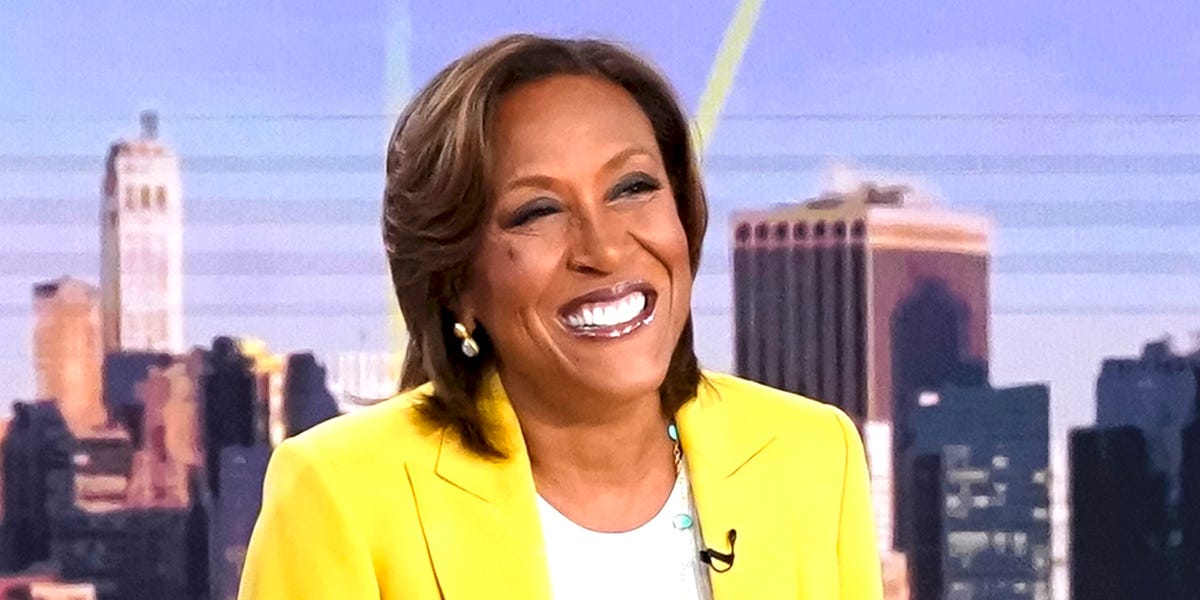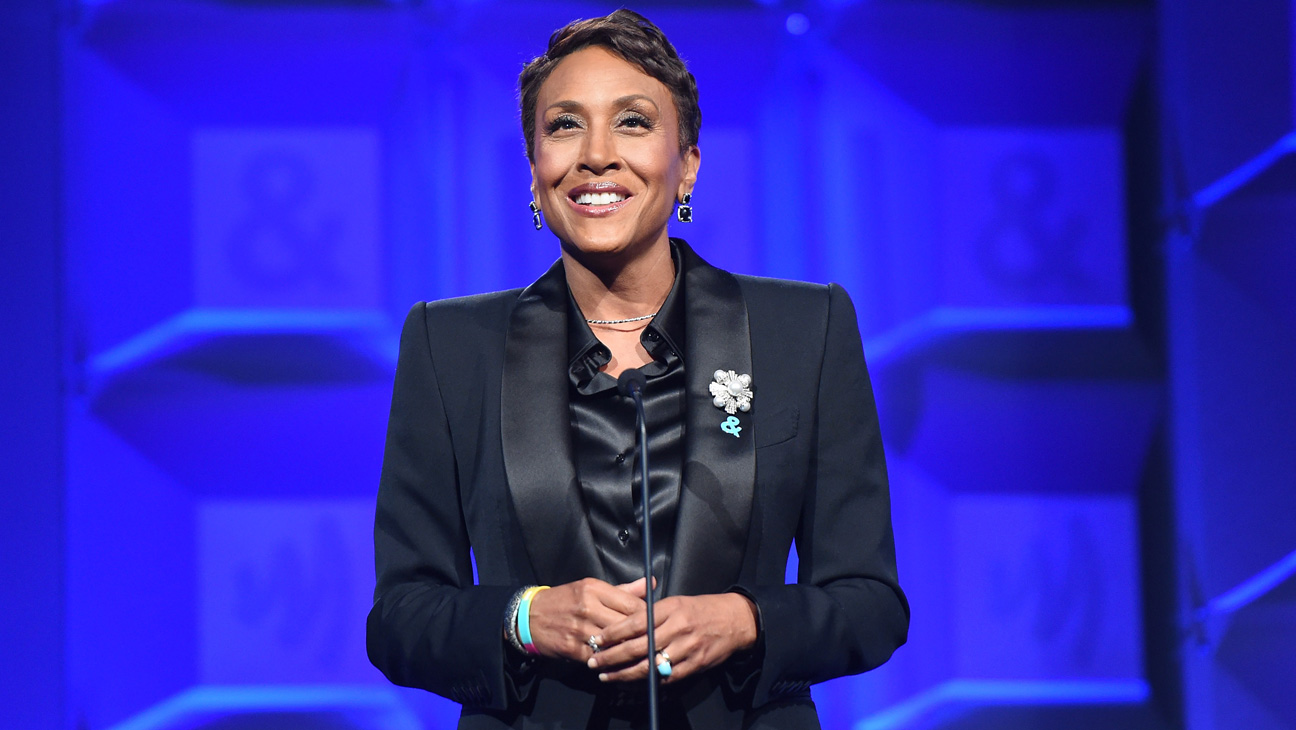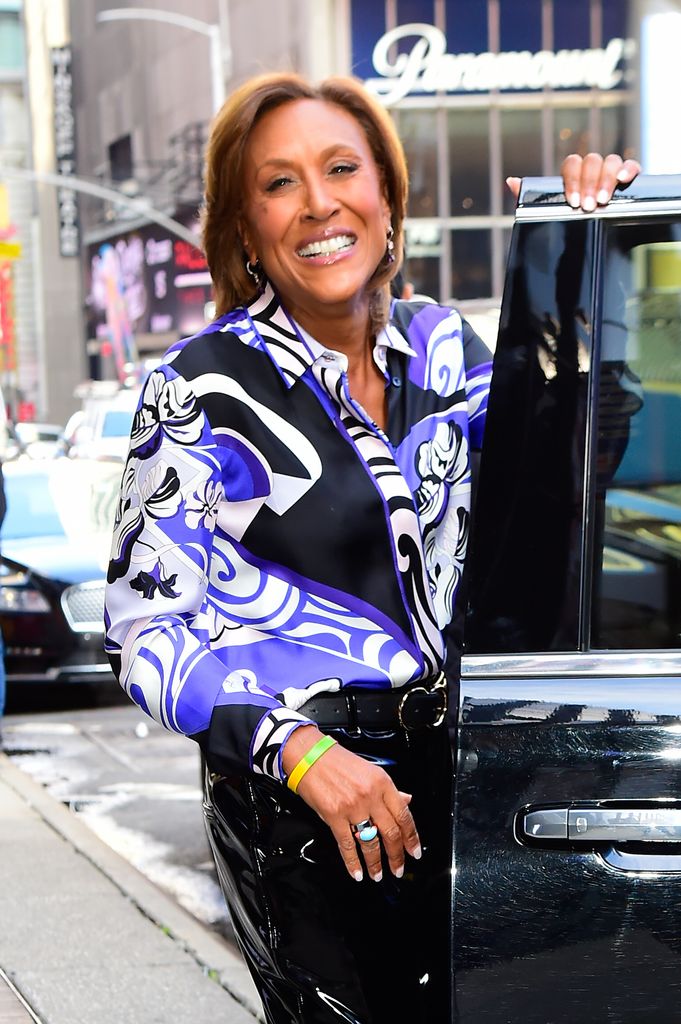Robin Roberts - Her Appearance In Crossword Puzzles
It's a curious thing, isn't it, how certain public figures become so much a part of our shared experience that their names start showing up in the most unexpected places? We see them on our screens, hear their voices, and then, quite suddenly, they appear in our daily diversions, like a familiar face in a crowd. This is, you know, very much the case for someone like Robin Roberts, whose name has a way of turning up in the neat little boxes of a crossword puzzle.
Think about it for a moment, how a simple grid of letters and hints can connect us to the broader world. These word challenges, with their clever wordplay and sometimes tricky hints, really do offer a quiet moment of thought, a chance to connect letters and ideas. They often draw from what's current, what's well-known, what's just generally part of our daily conversations. So, it makes a lot of sense, doesn't it, that popular personalities would find their way into these mental exercises?
Our recent look into some puzzle information, which includes clues related to "Fonts early show featuring robin roberts, for short g m a jargon l i n g o childish retort a r e s o sought office r a n not just in one's head a l o u d actor who." and "robin roberts' show, initially g m a take __", shows us just how this works. It's a fun way to see how people we recognize from television or other public roles become, you know, a piece of a larger cultural puzzle, literally.
Table of Contents
- Robin Roberts - A Presence in Puzzles
- The Charm of Crosswords
- Decoding the Clues
- Beyond the Broadcast - Robin Roberts in Pop Culture
- The Puzzle Solver's Delight
- The Craft of Clue Making
- A Glimpse at Other Familiar Names
- The Enduring Appeal of Wordplay
Robin Roberts - A Presence in Puzzles
It's always a little bit of a pleasant surprise, isn't it, when you're working through a crossword and a clue points to someone you know well? For many, that familiar face belongs to Robin Roberts, a person whose voice and presence are a regular part of morning routines. The clues we've seen, like "Fonts early show featuring robin roberts, for short g m a jargon l i n g o childish retort a r e s o sought office r a n not just in one's head a l o u d actor who." and "robin roberts' show, initially g m a take __", give us a peek into how she fits into the world of word puzzles. These hints, you know, usually point to her well-known morning program, often shortened to just a few letters.
How does Robin Roberts pop up in daily word games?
Well, it's pretty straightforward, actually. Puzzles, especially those found in newspapers like the LA Times, typically use clues that relate to current events, popular shows, or figures that most people would recognize. So, when a clue mentions "Fonts early show featuring robin roberts," it's asking for the common abbreviation of her morning program. This is a common way for puzzle makers to, you know, include well-known personalities. It relies on general knowledge, a sort of shared understanding of popular culture. It's a way to make the puzzle feel, in some respects, current and connected to the everyday lives of those solving it.
The hints often play on abbreviations or very specific associations, like the name of a show that someone hosts. It's not about her personal life, you know, or any deep biographical details. It's simply about her public role and how that role is widely known. This kind of clue is, arguably, a standard part of how crosswords work, using common references to help solvers find the correct short answer.
The Charm of Crosswords
There's something truly special about sitting down with a crossword, isn't there? It's a quiet challenge, a mental exercise that feels, you know, both relaxing and stimulating at the same time. For many, it's a daily ritual, a moment to step away from the rush of things and focus on words and ideas. The satisfaction of filling in those empty squares, of seeing the grid slowly take shape, is a simple but very real pleasure. It's a bit like solving a small mystery every day.
These puzzles, you know, have a way of drawing you in. You start with a few easy answers, then maybe a tricky one makes you pause and think. You might put the puzzle down for a bit, then come back later with a fresh perspective. That moment when a difficult clue suddenly makes sense, when the right word just clicks into place, is, like, pretty satisfying. It’s a feeling of small triumph, a little win in your day.
What makes these word challenges so engaging?
What makes these word puzzles so appealing, you ask? Well, it's a mix of things, actually. Part of it is the mental workout they provide. They ask you to recall facts, think about word meanings, and sometimes even play with sounds and spellings. It's a good way to keep your mind sharp, you know. Another part is the feeling of accomplishment. Each correct answer is a small victory, and completing a whole puzzle feels like a big one. It's a very accessible kind of challenge, too, something nearly anyone can try.
Then there's the element of discovery. You might learn a new word, or remember an old one you hadn't thought of in ages. Sometimes, you know, a clue will bring up a piece of pop culture or history that you had forgotten about, or maybe never even knew. This constant learning, even if it's just a little bit, adds to the fun. So, it's not just about filling squares; it's about, you know, expanding your own personal store of knowledge, just a little.
Decoding the Clues
When you come across a crossword clue, it's like a mini-riddle, isn't it? The puzzle maker gives you a hint, and you have to figure out the word that fits. These clues can be direct, or they can be a bit clever, playing on words or common sayings. The ones that mention public figures like Robin Roberts are usually, you know, pretty straightforward in their intent, even if the wording is a little playful.
For instance, a clue like "Fonts early show featuring robin roberts, for short g m a jargon l i n g o childish retort a r e s o sought office r a n not just in one's head a l o u d actor who." is a longer, more descriptive clue that points directly to her show, and then asks for its abbreviation. This type of clue, you know, relies on the solver knowing that popular abbreviation. It's a test of general cultural awareness more than anything else.
What kind of clues mention Robin Roberts?
The clues that bring up Robin Roberts typically refer to her connection with her well-known morning show. For example, we've seen clues that say "robin roberts' show, initially g m a take __". This kind of clue, you know, directly asks for the initials of the show she hosts. It's a very common type of clue in crosswords when referring to television programs or organizations with widely recognized acronyms.
These hints are designed to be recognizable to a broad audience, so they tend to focus on the most public and widely known aspects of a person's career. They don't, you know, delve into private matters or obscure facts. They stick to what's generally understood. So, if you know her show, you can usually figure out the answer pretty quickly, which is, you know, the whole point.
Beyond the Broadcast - Robin Roberts in Pop Culture
It’s interesting to consider how people who are often on our screens, like Robin Roberts, become part of the larger cultural fabric. Their names, their shows, their familiar faces, you know, become part of our collective consciousness. This is why they show up in things like crossword puzzles. It's a sign that they've reached a certain level of widespread recognition, a kind of cultural shorthand.
When a name appears in a crossword, it suggests that the person is a household name, someone most people would instantly recognize, at least in their public role. It means they've made an impact, you know, on a broad audience. It's a quiet testament to their presence in our daily lives, even if it's just through a few letters in a grid.
Why do figures like Robin Roberts appear in puzzles?
Figures like Robin Roberts appear in puzzles primarily because they are widely known and their public work is easily identifiable. Puzzle creators, you know, need clues that a good number of people will understand to make their puzzles solvable and enjoyable. Using a well-known personality, especially in connection with their most famous work, makes for a fair and accessible clue. It’s a way to connect with the solver’s general knowledge.
It also adds a touch of current relevance to the puzzle. While some clues might be about historical figures or very old references, including someone like Robin Roberts keeps the puzzle feeling, you know, fresh and connected to today's world. It's a way to reflect what's happening now, what people are watching and talking about, which is, you know, pretty smart for a puzzle.
The Puzzle Solver's Delight
There's a unique satisfaction that comes from solving a crossword, isn't there? It's that moment when a clue, which might have seemed a bit obscure at first, suddenly becomes clear. You connect the hint to a word, and then that word fits perfectly into the grid, crossing with other words you've already figured out. It's a bit like a small victory, a little spark of joy in your day.
For instance, when you see a clue about "robin roberts' show, initially g m a take __," and you immediately think "GMA," there's a pleasant feeling of recognition. It means your general knowledge, you know, is working for you. This kind of success, even in a small puzzle, can really brighten your mood. It's a simple pleasure, but a very real one, actually.
The delight also comes from the variety of clues. One moment you're thinking about a famous person, the next you're recalling a type of tree or a word from a different language. This constant shift in focus keeps the mind engaged and prevents the activity from feeling, you know, repetitive. It’s a constant little mental workout, always keeping you on your toes.
The Craft of Clue Making
Creating crossword clues is, you know, quite an art. The people who make these puzzles have to be very clever with words, finding ways to hint at an answer without giving it away too easily. They play with synonyms, common phrases, and even the sounds of words. It’s a delicate balance, making clues that are challenging but fair, so that a solver feels a sense of accomplishment, not frustration.
When they include a public figure like Robin Roberts, they usually pick an aspect that is widely known and easily abbreviated, like her show's initials. This shows a real understanding of what most people know, and how to use that knowledge to build a fun challenge. It’s about, you know, tapping into the collective memory of a community. They want to give you just enough information, but not too much, which is, you know, pretty smart.
They also have to make sure the answer fits the number of letters in the grid, which adds another layer of difficulty to their work. So, choosing "GMA" for "robin roberts' show, initially" works perfectly because it's a three-letter answer that many people recognize. It's a very precise kind of wordplay, requiring, you know, a lot of thought and careful planning.
A Glimpse at Other Familiar Names
It's not just Robin Roberts who pops up in these puzzles, of course. Our look at the puzzle information shows other well-known names, too. For instance, there are hints about "robin williams drama set at a prep school" and "robin williams role in aladdin." These clues, you know, also point to very famous works associated with those individuals.
We also saw references to "cnn anchor burnett" and "spokesowl who celebrates app streaks." This just goes to show how broad the range of general knowledge can be in crosswords. From news anchors to animated characters, if they're well-known enough, they can become a part of the puzzle. It's a way of reflecting, you know, the diverse things we encounter in our daily lives.
This mix of names and references is part of what makes crosswords so appealing. You never quite know what kind of clue you'll get next, which keeps things interesting. It's a fun way to see how, you know, different pieces of our shared culture are woven together in these little word games.
The Enduring Appeal of Wordplay
The love for word puzzles, like crosswords, has been around for a long time, and it's easy to see why. There's something deeply satisfying about playing with language, about finding just the right word to fit a particular spot. It’s a form of mental play that engages us in a unique way, allowing us to exercise our brains while having a bit of fun.
The way that public figures, such as Robin Roberts, become a part of this wordplay just adds another layer to the experience. It makes the puzzles feel more connected to the world we live in, more personal, in a way. It’s a reminder that even in a quiet moment of solving a puzzle, we're still connected to the broader stream of popular culture. This connection, you know, adds a lot to the overall enjoyment.

Robin Roberts Shares Update on GMA's Big Move

Robin Roberts quietly signs a $14 million deal as internal turmoil

GMA viewers missing Robin Roberts as she thanks them for support during